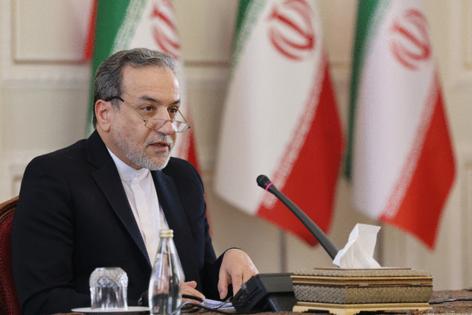Iran says ability to enrich uranium is 'nonnegotiable' in Trump nuclear talks
Published in Political News
Iran said it won’t be drawn into negotiations with the U.S. over its ability to enrich uranium and warned that fledgling nuclear talks with Washington may fall apart if the Trump administration “moves the goalposts.”
In two statements on Wednesday, senior Iranian officials signaled that fresh diplomatic efforts aimed at resolving a years-long standoff with the U.S. over Iran’s nuclear program may have hit their first stumbling block.
Iran’s Foreign Ministry spokesman, Esmaeil Baghaei, said in a post on X that “moving the goalposts constitutes a professional foul and an unfair act in football.” He added that shifting the parameters at the behest of hawkish politicians “could simply risk any overtures falling apart.”
Earlier, Iranian Foreign Minister Abbas Araghchi — who is leading the talks on behalf of the Islamic Republic — said he’d heard contradictory positions from his U.S. counterpart, Steve Witkoff, since their first meeting in Oman last Saturday that both sides described as constructive. The two are scheduled to meet again on April 19.
Iran needs “to hear their views in the negotiation sessions,” Araghchi told state TV. “If they continue to present conflicting and contradictory positions, things will be difficult.”
Iran and the U.S. started the talks in Oman in an effort to strike a deal that guarantees the Islamic Republic won’t develop nuclear weapons in exchange for sanctions relief. It’s a contentious issue that brought the two countries close to direct conflict during U.S. President Donald Trump’s first term.
In Witkoff’s first interview after the talks — which were mediated by the Omani government and took place in Muscat — the U.S. envoy said Iran must not be allowed to enrich uranium beyond a purity of 3.67%, a concentration suitable for power reactors but far below the level needed for bombs.
Tehran, which insists its nuclear program is solely for civilian purposes, had agreed to that limit under the terms of a 2015 accord but later breached it after Trump abandoned the multinational deal in 2018.
The U.S. government later backed away from Witkoff’s comments and he revised his position in a social media post.
“A deal with Iran will only be completed if it is a Trump deal,” he said. That means Iran “must stop and eliminate its nuclear enrichment and weaponization program.”
Witkoff is Trump’s main Middle East envoy and is also leading U.S. talks with Russia over the war in Ukraine.
Demanding that Iran end its uranium enrichment activity altogether would almost be akin to calling on it to dismantle its entire nuclear program. That’s something hardliners in Washington and Israel have been long sought.
Iran portrays its uranium enrichment as the bedrock of a decades-long nuclear program that consists of power plants and isotopes for medicine and industry.
After Trump abandoned the original nuclear deal and reimposed sanctions, Iran started to ramp up enrichment to 60%, a level of purity the International Atomic Energy Agency says is technically indistinguishable from weapons-grade fuel.
IAEA Director General Rafael Mariano Grossi is visiting Iran this week in an attempt to resolve his agency’s ongoing probe into uranium particles sampled at undeclared locations. Resolution of that investigation will play a role in any potential deal between the U.S. and Iran.
The IAEA expects negotiations between Iran and the U.S. could be concluded “successfully and swiftly,” Grossi said Wednesday after arriving for consultations in Iran. He urged Iran to quickly resolve a years-long probe into uranium particles detected by inspectors at undeclared locations.
With the Trump administration warning that failure to reach an agreement with Iran could result in military action, Grossi cautioned against escalation.
“We have always been very clear that attacks on nuclear facilities are not acceptable and make any problem worse,” he said in recorded comments shared with Bloomberg. An attack would carry “radiological consequences,” would have an “impact on the environment” and make the situation worse, he said.
_____
(With assistance from Jonathan Tirone.)
_____
©2025 Bloomberg L.P. Visit bloomberg.com. Distributed by Tribune Content Agency, LLC.




























































Comments